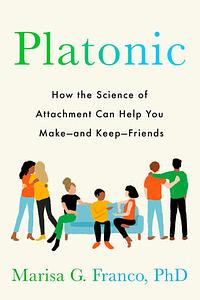Take a photo of a barcode or cover
810 reviews for:
Platonic: How the Science of Attachment Can Help You Make and Keep Friends as an Adult
Marisa G. Franco
810 reviews for:
Platonic: How the Science of Attachment Can Help You Make and Keep Friends as an Adult
Marisa G. Franco
Franco’s book offers a solid set of tools bolstered by research, though the anecdotes are occasionally long / overly introductory. That being said, the takeaways at the end of each chapter are helpful and there are many helpful summaries of other pop self-help resources. The target audience may be on the younger side (I got a strong 20-something vibe).
I’ll note that this book feels more, how shall I say this, focused on heterosexual community… there are several notes on how historical intimacy was deeper than it is in modern platonic relationships. I’m sure some of that is true, there’s been a great deal of change in western culture, but some anecdotes felt odd (example: the two women who exchanged rings and vows of best friendship, etc.). Lane Moore’s “You Will Find Your People” was more of a successful approach for me, but this was fine.
I’ll note that this book feels more, how shall I say this, focused on heterosexual community… there are several notes on how historical intimacy was deeper than it is in modern platonic relationships. I’m sure some of that is true, there’s been a great deal of change in western culture, but some anecdotes felt odd (example: the two women who exchanged rings and vows of best friendship, etc.). Lane Moore’s “You Will Find Your People” was more of a successful approach for me, but this was fine.
This was a selection for the Modern Mrs. Darcy Book Club. We spend a lot of time analyzing familial and romantic relationships but friendships are clearly important to our mental and physical health especially as we age.
I was particularly taken by the challenges described with friends across boundaries of privilege. The examples were racial but could also apply to class or economic status. Folks at a “lower” level feel obligated to conform to the cultural norms of the “higher” level which can be fatiguing and non-authentic. Studies suggest they are often misunderstood if they behave normally. This helps explain why groups tend to cluster around like race or status.
The author laid out a number of tenets and I summarized my takeaways for each:
1) Taking initiative (assume people like you, start conversation, follow up)
2) Express vulnerability (be yourself, ask for support when needed, don’t overshare)
3) Pursuing authenticity (recognize and adjust for power dynamic across privilege, be mindful of assumptions, listen more and repeat what is heard)
4) Harmonizing with anger (work through valued relationships with integrity and grace, lessen the priority of less valuable friendships if necessary)
5) Offering generosity (s/b proportional to depth of friendship)
6) Giving affection (give and receive warmly)
I was particularly taken by the challenges described with friends across boundaries of privilege. The examples were racial but could also apply to class or economic status. Folks at a “lower” level feel obligated to conform to the cultural norms of the “higher” level which can be fatiguing and non-authentic. Studies suggest they are often misunderstood if they behave normally. This helps explain why groups tend to cluster around like race or status.
The author laid out a number of tenets and I summarized my takeaways for each:
1) Taking initiative (assume people like you, start conversation, follow up)
2) Express vulnerability (be yourself, ask for support when needed, don’t overshare)
3) Pursuing authenticity (recognize and adjust for power dynamic across privilege, be mindful of assumptions, listen more and repeat what is heard)
4) Harmonizing with anger (work through valued relationships with integrity and grace, lessen the priority of less valuable friendships if necessary)
5) Offering generosity (s/b proportional to depth of friendship)
6) Giving affection (give and receive warmly)
hopeful
informative
inspiring
fast-paced
emotional
hopeful
informative
inspiring
slow-paced
challenging
hopeful
informative
inspiring
reflective
medium-paced
An incredible science-based wealth of knowledge on friendships and interpersonal relationships in general. Easy to understand, but detailed and full of depth. This book completely spoke my language.
informative
slow-paced
hopeful
informative
inspiring
reflective
medium-paced
- Favorite sections: initiating, generosity,
- Loved all of the scientific support
- So much information that was interesting on a social psychology level and applicable to everyday life!
- Great for reflecting
informative
reflective
fast-paced
Practical tips on how to create and prioritize meaningful platonic connections in your life. Very well researched and the author speaks in a way that is easily digestible for all to read.
When I started this book, I was close to dropping it, but I felt like the section on attachment intrigued me enough to keep reading. Overall, I feel like a lot of the advice was pretty common-sense and nothing that really surprised me. While I appreciate that Dr. Franco took the time to get into all of the nuances, it made the book feel long-winded. The Main Takeaways at the end of each chapter are necessary. With all that said, I think this research and work is much-needed.
funny
hopeful
informative
inspiring
lighthearted
reflective
medium-paced






